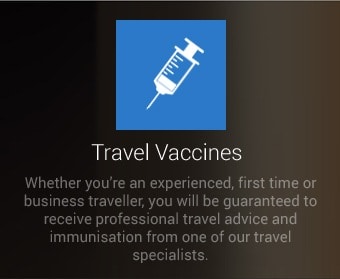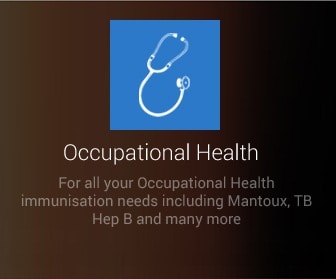Travel Advice |
Prevention |
Travel Advice Prevention
Travel Advice Prevention
TRAVEL RELATED MEDICAL ADVICE
Once our travel specialist has assessed your travel plans and overall health, he or she can provide information about the health risks that could be encountered and can give advice for minimising these risks.
VACCINES: Vaccines recommended for travel are discussed in detail in a separate topic review. (Please refer to the vaccine section)
FOOD AND WATER PRECAUTIONS: Several infections can be acquired by ingesting contaminated food and water, including infectious diarrhoea (traveller’s diarrhoea), hepatitis A, and typhoid fever.
In areas where sanitation and personal hygiene are poor, food and water precautions are essential for reducing the risk of these infections. These precautions will be most effective when they are used on a daily basis.
Tap water that looks safe to drink can carry infection-causing organisms, but boiling the water for three minutes, followed by cooling, can kill these organisms. Alternatively, a number of filtration devices or chemical disinfection agents (e.g., iodine or chlorine tablets) can be used.
Travellers can reduce the risk of infection by using the following precautions:
- Do not drink or brush the teeth with un-boiled tap water
- Do not drink beverages that contain ice made from un-boiled tap water
- Drink only boiled tap water, drinks made from boiled tap water, carbonated beverages, beer, and wine
- Be wary of locally bottled water, because safety and bottling conditions might not be adequate. Other drinks are probably safer.
Food can also contain infection-causing organisms. Reduce the risk of infection by following several food precautions:
- Do not eat unpeeled fruit; peel any fruit yourself before eating it.
- Do not eat raw vegetables
- Do not eat or drink unpasteurised (“raw”) dairy products
- Do not eat raw or rare meat, fish, or shellfish (including ceviche)
INSECT AND TICK BITES: In certain areas of the world, insects (mosquitoes, flies, fleas, bugs, and lice) and arthropods (ticks and mites) can transmit a number of potentially serious infections, including malaria.
Before you leave, you should buy insect repellents to bring with you. The best ones are DEET, picaridin, and permethrin; these can be purchased from Armada Travel Clinic where our travel specialists can advise and make recommendations.
You can lower your risk of infection by following these precautions every day while you are travelling:
- Whenever possible, avoid insect-infested and tick/mite-infested areas
- Wear protective clothing, including long-sleeved shirts and trousers; if you can, treat your clothing with permethrin
- Use insect and tick/mite repellents that contain DEET or picaridin
- Use mosquito netting over your bed; treat the netting with permethrin
- Check your skin regularly and remove any insects or ticks/mites
- Whenever possible, minimise time spent outdoors after dark
MALARIA PREVENTION
Malaria is a serious infection that is spread by the bite of an infected mosquito. The above suggestions can reduce the risk of being bitten. Anti-malaria medications are also recommended to people who travel to certain areas. These medications should be taken exactly as prescribed, starting before travelling to affected areas and continuing for up to four weeks after returning. The dosage and schedule depends upon which anti-malarial medication is used. Our travel specialist will recommend anti-malaria tablets to keep you safe on your travels. Being aware of risk factors plays a large role in protecting yourself from malaria; therefore consult with our travel specialist whilst planning your trip abroad.
INFECTION-CAUSING ORGANISM
Open water, soil, and sand can harbour infection-causing organisms in some areas of the world.
In countries where schistosomiasis (a water-borne parasitic infection) is common, travellers should avoid swimming in fresh water. Even brief exposure to infested water (for example, during rafting) can result in infection. In contrast, swimming in salt water or chlorinated water in these countries is safe.
When you are travelling, do not walk barefoot on soil or sand that could be contaminated with dog or human faeces. This can lead to hookworm or strongyloidiasis infections (worms that can penetrate the skin and cause itching, stomach symptoms, and other problems).
SEXUALLY TRANSMITTED DISEASES
Studies of travellers’ behaviours indicate that many people are more sexually active during travels. The hepatitis B virus, the human immunodeficiency virus (HIV, the virus that causes AIDS), as well as more common infections, such as gonorrhoea, chlamydia, and syphilis, are all transmitted by sexual contact, and are often more prevalent in developing countries.
Avoiding sexual contact eliminates the risk of acquiring sexually transmitted disease during travel. Use of barrier methods, such as a latex condom or diaphragm, reduces the risk of disease transmission, although they do not eliminate the risk.
PERSONAL MEDICATIONS
Medications available in the United Kingdom may not be available in other countries. Therefore, travellers who must take medication regularly should bring enough medication with them for the duration of their trip. Medications should be taken on the plane in a purse or other carry-on bag, rather than packed in luggage, to avoid loss or theft. Travellers who require syringes to administer medication should carry those syringes along with a letter from their GP documenting a medical need for the syringes.
AVOIDING ACCIDENTS
Accidents, especially motor vehicle accidents, account for about 25 percent of deaths in travellers. The risk of accidents, injury, and death may be reduced by taking several precautions:
- Avoid driving at night, which can minimise exposure to alcohol-impaired drivers
- Familiarise yourself with the local driving conditions
- Wear a seat belt at all times
- Avoid drinking alcoholic beverages and driving
- If using motorised cycles, wear helmets and be especially cautious





